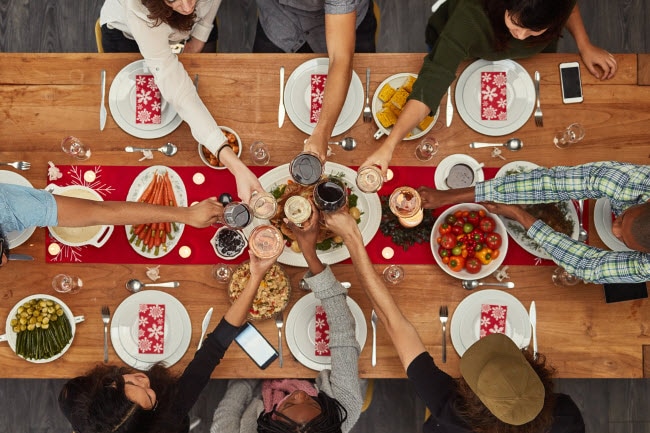The holidays are almost here. Over the next couple of months, you probably will share several big meals with family and friends, enjoying fine food and even better conversation.
But a meal with loved ones can be a potentially dangerous thing, according to new report.
A team of British and Australian researchers at the University of Birmingham pored over data from 42 studies and concluded that people eat substantially more food when dining with others than when eating alone.
For example:
- One study found that people who dine with others consume up to 48% more food than people who eat alone.
- Another study found that obese women eat up to 29% more when sharing a meal with others than when eating alone.
“When people go out to eat with family or friends, or plan to cook a meal for others, their eyes may be bigger than their stomachs," says Lizzie Streit, a Minneapolis-based registered dietitian nutritionist and creator of It's a Veg World After All.
Why we overeat around others
One reason people eat so much in social situations is that typically, more food is available in such settings.
“People tend to overestimate how much food they need to order or prepare to feed a larger group,” says Streit, who was not involved with the University of Birmingham study.
As a result, more food is consumed because it is "right there in front of them,” she adds.
In addition, social occasions naturally lend themselves to certain types of foods that may not be great for our waistline and long-term health.
“You may also be more inclined to order more indulgent appetizers and dishes that are easier to share than lighter salads or vegetable dishes,” Streit says.
The University of Birmingham research team also uncovered a fascinating fact about social overeating. While people tend to eat more in the company of family and friends, they are less likely to overindulge when dining with people they do not know well.
The researchers speculate that we might overeat around loved ones for evolutionary reasons. In the past, we shared food because it protected us in times when food was scarce.
So, eating more food with family and friends could be a method of strengthening social bonds that stretches back to our days as hunter gatherers, according to the researchers.
How to avoid overeating
While we may have a natural tendency to overeat around loved ones, we do not have to accept overindulgence as our fate.
Careful meal planning can help curb nature’s worst instincts. For example, before eating with loved ones at a restaurant, Streit suggests scanning the menu and choosing one or two items that would satisfy you.
“Advocate for ordering at least one of them in the group,” she says. “That way, you have an option that you know you will like, and may not feel as pulled toward other less-healthy options.”
For meals at a friend or family member's home, volunteer to bring a dish on the lighter side. Start with that food before turning to other fare.
“You should still enjoy what the others in your group prepared,” Streit says. “But try starting with a smaller portion than you think you need and assess how satisfied you are after eating before going up for seconds.”
Also, do not succumb to the temptation to fast before big meals with loved ones. Trying to “make room” for overeating later can backfire.
“If you eat a normal day of meals, you will feel less likely to grab everything in sight at holiday parties,” Streit says.
Above all, keep focused on moderation, and do not become obsessed about the possibility that you may overeat.
“It’s important to remember to enjoy food with others,” Streit says. “Sharing a meal is supposed to be a fun -- not stressful -- experience.”




